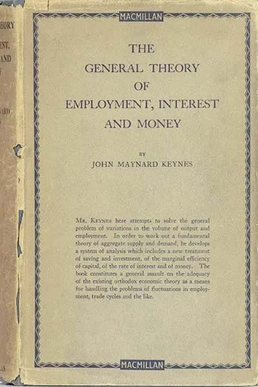
Cost accounting is defined by the Institute of Management Accountants as "a systematic set of procedures for recording and reporting measurements of the cost of manufacturing goods and performing services in the aggregate and in detail. It includes methods for recognizing, allocating, aggregating and reporting such costs and comparing them with standard costs". Often considered a subset of managerial accounting, its end goal is to advise the management on how to optimize business practices and processes based on cost efficiency and capability. Cost accounting provides the detailed cost information that management needs to control current operations and plan for the future.

A stock market, equity market, or share market is the aggregation of buyers and sellers of stocks, which represent ownership claims on businesses; these may include securities listed on a public stock exchange as well as stock that is only traded privately, such as shares of private companies that are sold to investors through equity crowdfunding platforms. Investments are usually made with an investment strategy in mind.
Spread betting is any of various types of wagering on the outcome of an event where the pay-off is based on the accuracy of the wager, rather than a simple "win or lose" outcome, such as fixed-odds betting or parimutuel betting.

In finance, a bond is a type of security under which the issuer (debtor) owes the holder (creditor) a debt, and is obliged – depending on the terms – to provide cash flow to the creditor. The timing and the amount of cash flow provided varies, depending on the economic value that is emphasized upon, thus giving rise to different types of bonds. The interest is usually payable at fixed intervals: semiannual, annual, and less often at other periods. Thus, a bond is a form of loan or IOU. Bonds provide the borrower with external funds to finance long-term investments or, in the case of government bonds, to finance current expenditure.
In finance, an interest rate swap (IRS) is an interest rate derivative (IRD). It involves exchange of interest rates between two parties. In particular it is a "linear" IRD and one of the most liquid, benchmark products. It has associations with forward rate agreements (FRAs), and with zero coupon swaps (ZCSs).

In the social sciences, bargaining or haggling is a type of negotiation in which the buyer and seller of a good or service debate the price or nature of a transaction. If the bargaining produces agreement on terms, the transaction takes place. It is often commonplace in poorer countries, or poorer localities within any specific country. Haggling can mostly be seen within street markets worldwide, wherein there remains no guarantee of the origin and authenticity of available products. Many people attribute it as a skill, but there remains no guarantee that the price put forth by the buyer would be acknowledged by the seller, resulting in losses of profit and even turnover in some cases. A growth in the country's GDP Per Capita Income is bound to reduce both the ill-effects of bargaining and the unscrupulous practices undertaken by vendors at street markets.
In accounting, book value is the value of an asset according to its balance sheet account balance. For assets, the value is based on the original cost of the asset less any depreciation, amortization or impairment costs made against the asset. Traditionally, a company's book value is its total assets minus intangible assets and liabilities. However, in practice, depending on the source of the calculation, book value may variably include goodwill, intangible assets, or both. The value inherent in its workforce, part of the intellectual capital of a company, is always ignored. When intangible assets and goodwill are explicitly excluded, the metric is often specified to be tangible book value.

The General Theory of Employment, Interest and Money is a book by English economist John Maynard Keynes published in February 1936. It caused a profound shift in economic thought, giving macroeconomics a central place in economic theory and contributing much of its terminology – the "Keynesian Revolution". It had equally powerful consequences in economic policy, being interpreted as providing theoretical support for government spending in general, and for budgetary deficits, monetary intervention and counter-cyclical policies in particular. It is pervaded with an air of mistrust for the rationality of free-market decision making.
In finance, a convertible bond, convertible note, or convertible debt is a type of bond that the holder can convert into a specified number of shares of common stock in the issuing company or cash of equal value. It is a hybrid security with debt- and equity-like features. It originated in the mid-19th century, and was used by early speculators such as Jacob Little and Daniel Drew to counter market cornering.
The yield to maturity (YTM), book yield or redemption yield of a fixed-interest security is an estimate of the total rate of return anticipated to be earned by an investor who buys it at a given market price, holds it to maturity, and receives all interest payments and the capital redemption on schedule.
Fixed income refers to any type of investment under which the borrower or issuer is obliged to make payments of a fixed amount on a fixed schedule. For example, the borrower may have to pay interest at a fixed rate once a year and repay the principal amount on maturity. Fixed-income securities can be contrasted with equity securities that create no obligation to pay dividends or any other form of income. Bonds carry a level of legal protections for investors that equity securities do not: in the event of a bankruptcy, bond holders would be repaid after liquidation of assets, whereas shareholders with stock often receive nothing.
Floating rate notes (FRNs) are bonds that have a variable coupon, equal to a money market reference rate, like SOFR or federal funds rate, plus a quoted spread. The spread is a rate that remains constant. Almost all FRNs have quarterly coupons, i.e. they pay out interest every three months. At the beginning of each coupon period, the coupon is calculated by taking the fixing of the reference rate for that day and adding the spread. A typical coupon would look like 3 months USD SOFR +0.20%.

The Eurosystem is the monetary authority of the eurozone, the collective of European Union member states that have adopted the euro as their sole official currency. The European Central Bank (ECB) has, under Article 16 of its Statute, the exclusive right to authorise the issuance of euro banknotes. Member states can issue euro coins, but the amount must be authorised by the ECB beforehand.
A bilateral monopoly is a market structure consisting of both a monopoly and a monopsony.
The Kazakhstan Stock Exchange is a stock exchange located in Almaty, Kazakhstan. The exchange was founded in 1993.
In business, a trojan horse is an advertising offer made by a company that is designed to draw potential customers by offering them cash or something of value for acceptance, but following acceptance, the buyer is forced to spend a much larger amount of money, either by being signed into a lengthy contract, from which exit is difficult, or by having money automatically drawn in some other method. The harmful consequences faced by the customer may include spending far above market rate, large amount of debt, or identity theft.
A fixed-price contract is a type of contract for the supply of goods or services, such that the agreed payment amount will not subsequently be adjusted to reflect the resources used, costs incurred or time expended by the contractor. This contract type may be contrasted with a cost-plus contract, which is intended to cover the costs incurred by the contractor plus an additional amount for profit, and with time-and-materials contracts and labor-hour contracts. Fixed-price contracts are one of the main options available when contracting for supplies to governments.
Jago Grahak Jago is a consumer awareness program launched in 2005 by the [[Ministry of ConsumGovernment of India. Under this scheme, various channels were created to spread awareness about consumer rights and to put an end to malpractices by merchants. Due to this, many ongoing malpractices were put to an end and good quality products were delivered to the consumer. Under this scheme, a consumer forum was established, and a consumer court was created to handle consumer cases. At the consumer forum, complaints are received and then proceedings over the case are carried out in courts. By providing various helpline numbers Jago Grahak Jago achieved mass popularity and quickly reached out to very end node i.e. consumer.
This glossary of economics is a list of definitions of terms and concepts used in economics, its sub-disciplines, and related fields.
Ujjivan Small Finance Bank Limited is an Indian small finance bank based in Bangalore, which commenced operations on 1 February 2017. Ujjivan Financial Services holds an 80 percent stake in the bank.




